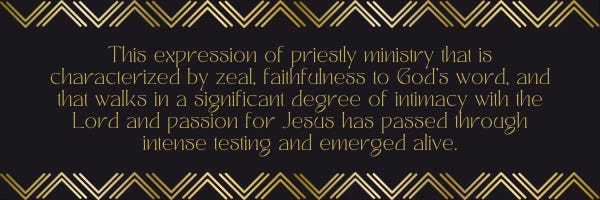The Correction We Need: The Death of Melchizedek
Today’s offering is on the correction we need to move forward.
Several weeks ago, I wrote an article called “Don’t Overcorrect.”
It was a seasoned take on the Mike Bickle sexual misconduct scandal, and an encouragement for those in the prayer and worship movement not to lose heart and quit because of what happened, as many have done. The article ended up getting many more views than our usual articles, attracting a lot of controversy on social media with some attacking it and others defending.
While my last article focused on avoiding overcorrection, that does not mean all is well in the prayer and worship movement.
Today’s offering is on the correction we need to move forward.
This will be more prophetic than my usual writing, focusing on a dream I received more than three years ago. Until this week, I have only shared it privately with a few friends. After meditating on it for a season, I think now is the time to share the dream and begin to unpack the interpretation.
The Dream: Melchizedek and Phineas
It was summer, 2021. My wife and I had just celebrated our 20th wedding anniversary a few days earlier. We spent the night in Hot Springs, Arkansas, returning from a powerful gathering of 10 Days of Prayer leaders in north Texas.
That night, I had a dream that has disturbed me for three years. The dream was so troubling that in all honesty, most of the time, I do not want to think or talk about it.
The dream related to my two youngest sons, Melchizedek (the older) and Phineas (the younger). At the time, they would have been eight and six years old. When both boys were born, I felt the Lord led me to name them after priests who had their own, special covenants with God. (Psalm 110, Numbers 25:12-13)
In the dream, I told my sons to spend the night inside our wood-burning stove. They obeyed me. The stove was on, and it was running very hot, much hotter than I would ever allow it in real life for fear of warping the metal. It was far too hot for anyone to survive inside.
When morning came, I came downstairs to check on them. Phineas had survived spending the night in the furnace. But Melchizedek had not. Phineas was holding the dead body of Melchizedek in his arms. He was covered in black soot and hanging limp in Phineas’ arms. Phineas had this look of despondency on his face. He had not been able to save him even though they had been very close together all night, wrapped up almost in a ball together in an attempt to survive the heat. When I saw my son, lying there, dead, I picked him up in my arms and began wailing uncontrollably. It was the deepest weeping I had ever known. Mourning, as Zechariah 12:10 describes, as for an only child, a firstborn.
The dream shifted to the aftermath of his death. Now I was no longer holding him in my arms, I was visiting places we would go together during day to day life. Each place brought back memories of Melchizedek, and led me into more weeping, greater sadness. Everywhere I looked, everything I did reminded me of the one I had lost and led me into a fresh wave of wailing and tears.
I woke up from the dream sobbing uncontrollably. My pillow was soaked because I had been crying in my sleep.
My wailing woke up my wife, who assured me our son was alive and well in the real world.
Real World Resonance
After significant dreams like this, I pay attention to events in waking life that remind me of the dream. These are often keys to proper interpretation. There were three of them that summer.
Shortly after the dream, I spoke at a church that was committing a serious injustice against a long-time leader. As I shared, rather than rebuke anyone, I just wept and wept in public. It was completely out of character for me. I felt the same way I felt in the dream as I wept without shame in public.
A couple months later, one of my very good friends, Gregg Healey, lost his teenage son, Ryan, to cancer. After months of united prayer for healing by many of us, the young man died anyway. As he described his grief at the loss of his son, it was just like what I had experienced in the dream.
Three months after the dream, another one of my best friends, Satt Scrivner, had a powerful impartation from God to walk in supernatural righteousness. The encounter lasted for three days, where a special indwelling grace seemed to permeate His entire being, enabling him to abide in Christ and walk in true righteousness.
After three days, this special grace lifted. Satt, who is known for joy in the Holy Spirit, became a man of inconsolable tears—I had never seen him like this before. He had tasted something so incredible that normal life seemed unbearable. Every time we talked, he would just cry and cry.
I had no idea how to console him.
An Interpretation: Three Personal Events
As I’ve meditated on the three personal events that resonated with the dream, I’d summarize them this way symbolically:
A failure of leadership to stand for truth while under incredible pressure.
A weakness of our best united prayer to bring breakthrough, leading to death.
An inability to walk in genuine righteousness, leading to inconsolable grief.
Symbols in the Dream
In dreams, God speaks to us in highly symbolic language. Let’s unpack the symbolism of the dream as we move towards an interpretation.
The wood-stove or furnace is the place of testing and refining. The extremely high temperature in the stove indicates that the testing was incredibly intense.
The night represents a season where darkness is given some measure of dominion so that truth and faith can arise. Think Daniel in the lion’s den or Job’s time of testing before God arrives in the whirlwind.
Phineas and Melchizedek are two different Biblical priests, representing two different covenants, and two different ways of ministering to God.
Phineas is 6 years old, representing man and man’s ability. Melchizedek is 8 representing a “new creation” and the age to come. Adam was made on the sixth day, while Jesus, the second Adam rose on the eighth day.
Their being intertwined in the furnace indicates their interconnectedness. These two were growing up together side-by-side.
One priest survived the furnace. The other did not. However, rather than rejoicing that one son had survived when both might have died, the death of Melchizedek filled the father in the dream with an inconsolable grief.
Phineas’ face indicated his own sorrow and helplessness to bring Melchizedek out alive in spite of his best efforts.
The grief had an immediate, deep impact on the father but then lingered—everything he would experience afterwards was touched by the sorrow of his loss.
Perspective in the Dream
In the dream, I realized I was seeing and experiencing things from the perspective of Father God.
The reason is simple: I had ordered my sons into the furnace of testing and affliction. My natural mind was “dream stupid”, it could not understand why I would ever make my sons spend the night in the furnace. I woke up questioning my goodness and qualifications as a father. However, Father God promises us we will experience testing and trial. It’s part of how He operates.
The death of Melchizedek caused the Father to mourn greatly. Melchizedek was very dear to His heart.
Understanding Phineas and Melchizedek
If there’s one word to describe Phineas, it’s zeal.
Phineas was a Levitical priest, a grandson of Aaron. When a plague was afflicting the Israelite camp because of sexual immorality, idolatry, and intermarriage, he took a spear and killed two people in the act of consummating their illicit union (Numbers 25). Yahweh says of Phineas, “He was jealous with My jealousy.” The zeal of Phineas is like God’s zeal; it turned God’s wrath away from Israel. The Lord goes as far as to make a special covenant of peace with Phineas, a perpetual priesthood with him and with his descendants.
Melchizedek means “King of Righteousness.” He was a priest-king, the king of Salem, which means “peace.” David, in Psalm 110, speaking of the Messiah declares that He is “a priest forever in the order of Melchizedek”. Jesus is described in the book of Hebrews as a high priest according to the order of Melchizedek, the fulfillment of Psalm 110.
To be a priest/king like Melchizedek is to enter a mature ministry that looks like Jesus in power, effectiveness, humility, and righteousness (Hebrews 5-7).
Phineas and Melchizedek have many similarities. Both have a special covenant with God that is called “perpetual” or “eternal”. Both are characterized by peace or “shalom”. Both have loyalty to God and commitment to righteousness.
However, there is no doubt that the Priesthood of Melchizedek is greater, given that the author of Hebrews applies this priesthood to Jesus himself. Among other differences, Phineas represents the Old Covenant priesthood, a priesthood that required continual sacrifices, one that would eventually be superseded. Melchizedek represents an eternal priesthood based on a once for all sacrifice. Phineas is a priest only. Melchizedek is a priest and a king.
Interpretation
I believe this dream was intended for what we might call the “prayer movement” or the “revived church.” It’s the part of the church that is active in priestly ministry to the Lord in the power of the Holy Spirit.
Here’s the good news. I believe part of what God has established in our generation, symbolically the priesthood of Phineas, has passed an incredibly difficult test. This expression of priestly ministry that is characterized by zeal, faithfulness to God’s word, and that walks in a significant degree of intimacy with the Lord and passion for Jesus has passed through intense testing and emerged alive. It is currently active on the earth.
Symbolically, Phineas represents the best of our zeal for God and our efforts for righteousness can produce. This includes modern revival movements, 24/7 prayer expressions and other prayer and prophetic movements, and the powerful modern worship movement. Make no mistake, these are good things and all of these expressions are proper responses to God within the abilities and realities of the current age.
However, I believe the Lord is saying a death has occurred. Something that was growing up alongside these expressions, something that was intertwined with them, and that was even the ultimate goal of these expressions, has died. The goal was never 24/7 prayer in a building. The goal was always a people that are a dwelling place for God in the Spirit 24/7, a bride that is a fit companion for the King.
The Father’s focus has moved from thankfulness that Phineas has survived into weeping for the loss of his older brother, who is someone and something greater.
I think it is possible that we had a window in our generation to walk into something much greater than the priesthood of Phineas, something that partakes to a greater degree of the realities of the age to come. We may have had an opportunity to walk in an expression of the Melchizedek priesthood. This is a kingly priesthood of people who look like Jesus, act like Jesus, and walk like Jesus.
Something that was beginning to mature in the earth has failed the test and died. This child was very important to the Father. It represented a maturity of the priestly and kingly ministries on earth that would be the fitting counterpart to Jesus’s high-priestly ministry in heaven. It’s the mature priesthood that will be on the earth before the Lord returns.
The Father himself is weeping over it. And He’s calling us to join in the lament. I believe this is the main thrust of the dream from the Lord.
Righteousness
This failure to pass the test and the resulting death is confirmed by the failures of righteousness in the revived church since the dream.
What’s happened over the last years at IHOPKC and many other ministries is an example of how the “revived church” is suffering loss in this season. I don’t say this to pass judgement: I’m very aware that my own sins and sinfulness are part of the problem. I am not able to walk in the righteousness that is God’s standard. I’m not saying this from a standpoint of maturity. I’m speaking as one who is mired in immaturity.
These failures point to a deeper problem in the prayer movement, a lack that the zeal of Phineas is not able to bring forth. God was and is looking for something more to come forth.
Because we have never fully known this inner reality, represented in the dream by Melchizedek, we do not have the faith to receive it or see it come forth.
Father God is inviting us to share His own mourning over this reality as an initial movement toward a truly righteous, refined priesthood that will characterize the Church at the end of the age (Malachi 3:2-4).
How should we respond?
There is much more to say here, but I have said all I can say for now. As we continue to ponder these things, I will close with what I think are the main responses God is looking for in response to the dream:
I believe God is inviting us to shift our focus from satisfaction in the incredible growth and maturity of prayer and worship over the past 40 years to recognizing that something even more significant is still lacking. Phineas coming through the fire is an amazing victory, but this was not the Father’s focus.
We need to recognize that we do not currently have faith to receive the reality of a true Melchizedek priesthood. Phineas is not able to bring Melchizedek from the fire. There is a genuine repentance for unbelief that is needed.
Most of all, I think the Father is inviting us to mourn with Him, to mourn the failure of our own zeal to produce righteousness, to mourn the lack of effectual prayer and the failure of many of our prayers, and to mourn the absence of a kingly priesthood on earth that corresponds to our high-priest in heaven.











😢 Yes, I’m feeling that need for comfort from the Father that only comes when we enter into spiritual mourning (Mt. 5:4).